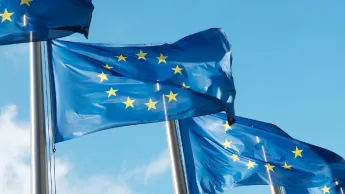A European Election takes place in June. Many EU citizens attach little significance to the EU Parliament. Yet it's one of the EU’s most important institutions. Here you’ll find everything you need to know about the election and its significance.
There are almost 450 million people in Europe who are called upon to elect a joint parliament in early June. The Parliament of the European Union (EU). This is unique, because the is a federation of 27 Member States that also have their own national parliaments. Such close cooperation has an historical background. There was a widespread desire in Europe after the Second World War to never again wage war against one another. Even those countries that were invaded by Nazi Germany were ready to support reconciliation. On 9 May 1950, French Minister for Foreign Affairs Robert Schuman first proposed the establishment of a European Coal and Steel Community (ECSC), in other words collaboration in the production of coal and steel in Europe. This project, which involved six Member States, was the starting point for the present Union with its shared institutions, collective laws and a common budget. The day on which Schumann delivered his speech is known as Europe Day. On 9 May, so-called Europe Day, the EU celebrates the fact that people within the Union now coexist in peace. Only one country, the United Kingdom, has since withdrawn from the EU. Many others want to join the EU. This indicates that it is still deemed to be a . Below we explain the most important decision-making bodies of the EU.
How does the EU work (and why is it so complex)?
Disclaimer: The video is from 2019, when the UK was still a member of the EU.
The European Parliament
The , which is to be newly elected in June, contains 705 from all 27 EU Member States. The citizens of these Member States respectively elect their representatives. They then have the opportunity to help shape and pass legislation, and to debate topical political issues. So what makes this special? The parliamentarians collaborate in transnational groupings that come together according to political tendencies. There is for instance a conservative, a green and a social-democratic grouping. Points of order and important papers are translated into all 24 of the EU’s official languages. A further peculiarity of the European Parliament is the fact that it meets in two different locations. The plenaries take place in Strasbourg, France, the committees meet in Brussels, Belgium.
The European Council
The EU heads of state and government meet four times a year at a . They determine the overall alignment of EU policy and have decision-making authority over many key topics. This body reaches compromises in the event of collaborative conflicts. The common asylum policy is an enduring topic in the European Council, for example. A president elected by the heads of state and government coordinates cooperation with the remaining EU institutions.
The Council of the European Union
The name makes it sound similar to the European Council, yet it is an independent institution. It is where Ministers of the Member States consult on common policy relating to their field of expertise. They also draft and reach agreement on European legislation. Each of the Member States takes it in turn to chair the Council for six months. The chairing country can set substantive priorities during this time.
The European Commission
The could be described as the EU’s government. Unlike national governments though, the Commission can’t enact laws and isn’t elected by the EU citizens. It only makes proposals for EU legislation and policy. It has for instance devised a plan relating to how Europe can become climate-neutral – the so-called Green Deal. It also keeps an eye on the EU budget. Each country delegates a member of the Commission who is then responsible as commissioner for a specific policy area. The Commission employees are EU officials. Its president is mutually determined by the Member States. It is currently the German politician Ursula von der Leyen. Together with the President of the European Council, she outwardly represents the EU.
Voting in European Elections
What do the twelve golden stars on the EU flag represent?

